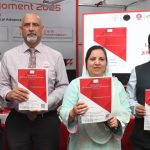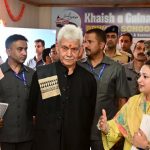New Delhi, Aug 16: “It has been recently decided to conduct the Central government job test in 15 Indian languages so that the language barrier does not let any youth miss the job opportunity. These will include different regional languages including Kannada, Tamil, Telugu, Assamese, Bengali, Gujarati, Konkani, Malayalam, Manipuri, Marathi, Odia, Punjabi and Urdu,” said Union Minister of State (Independent Charge) Dr Jitendra Singh on Wednesday.
The minister lauded the efforts of the Staff Selection Commission (SSC) for arranging to conduct, for the first time, the Multi Tasking (Non-Technical) Staff examination in 13 regional languages in addition to Hindi and English.
He said notable progress has been made in the last more than nine years under the leadership of Prime Minister Narendra Modi to promote the Indian regional languages besides the official Language Hindi. This historic decision will give impetus to the participation of local youth and encourage regional languages, he said.
In addition to Hindi and English, the question paper will be set in the 13 regional languages i.e. Assamese, Bengali, Gujarati, Marathi, Malayalam, Kannada, Tamil, Telugu, Odia, Urdu, Punjabi, Manipuri (also Meiti) and Konkani, the minister said, adding that the decision will result in lakhs of aspirants taking part in the examination in their mother tongue/regional language and improve their selection prospects.
Dr Jitendra said there had been persistent demands from different States to hold SSC exams in languages other than English and Hindi. The government appointed an Expert Committee to look at this aspect too amongst other things (review of the scheme and syllabus of examinations conducted by the Commission).
Though the policy was initiated with the Official Language Rules, 1976, significant progress has been made only in the last five-six years, he said.
The DoPT Minister said the Staff Selection Commission recently unveiled the format for candidates to write their examination in 15 languages, and plans are afoot to allow written tests in all 22 Scheduled Languages.
Dr Singh said Prime Minister Narendra Modi has taken a “very historic decision” in the new National Education Policy (NEP) by giving importance to the mother tongue of students in Primary, Technical and Medical education.
The government introduced three “path-breaking” bills in the parliament during the recently-concluded Monsoon session to replace the two-centuries-old criminal justice system, a legacy of the colonial era, he said.







